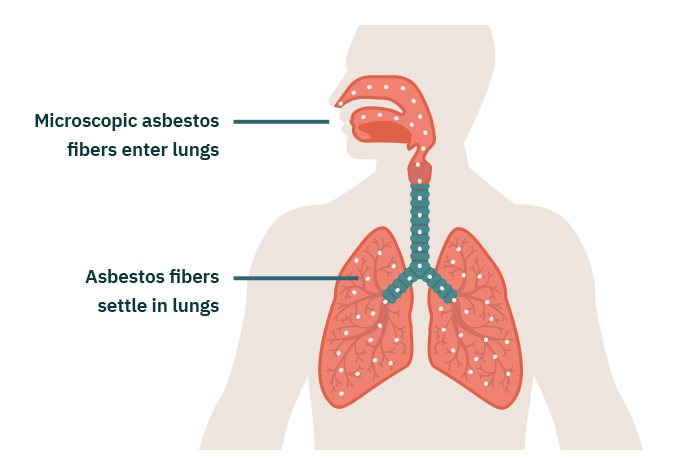How Asbestos Causes Mesothelioma
Mesothelioma develops in the mesothelium, a thin membrane encompassing the body’s internal organs and cavities. It is caused by exposure to asbestos, often in a workplace environment, though exposure can also take place at home, school, or another location.

In the most common scenario, asbestos fibers are inhaled and eventually become embedded in the lining of the lungs, abdomen, or heart, causing harmful inflammation that eventually leads to the formation of tumors. In some cases, swallowing asbestos fibers could contribute to a type of mesothelioma that forms in the abdomen, known as peritoneal mesothelioma. Asbestos may also travel through the lymph nodes to other parts of the body, such as the pericardium, the mesothelial layer surrounding the heart.
As generally understood by researchers, asbestos can cause DNA damage both directly and indirectly. Directly, asbestos interferes with the mitosis process in cell division, which can cause cellular damage and mutation. Indirectly, asbestos can cause mesothelial cells to release mutagenic reactive oxygen and nitrogen, which also causes mutation.
The process by which asbestos causes mesothelioma can take a very long time. In most cases, it takes anywhere from 10 to 50 years for mesothelioma to develop after the asbestos exposure occurs. However, in a small number of cases, the latency period is much shorter, and there have even been known cases of mesothelioma in children and young teenagers.
Some Asbestos Types May Cause Mesothelioma More Often
Asbestos is a generic name for six types of silicate minerals that share common properties. Some studies have shown that certain forms of asbestos may cause mesothelioma at greater rates than others.
One early study, published in 1986, suggested that crocidolite asbestos is about 14 times more potent than other forms of asbestos when it comes to causing both pleural mesothelioma and peritoneal mesothelioma. However, later reviews of the same data indicated that the incidence rate of mesothelioma based on asbestos type was actually much closer.
The most recent consensus among medical professionals is that amphibole asbestos forms – in particular, crocidolite – are more potent than serpentine forms of asbestos, such as chrysotile. Even so, both forms of asbestos are highly carcinogenic. As the Environmental Protection Agency (EPA) has reported, there is no safe level of asbestos exposure, regardless of the type.
Other Causes and Contributing Factors
Asbestos is by and large the most significant cause of mesothelioma, with at least 80% of mesothelioma patients having a known history of asbestos exposure (and the rest possibly being exposed without their knowledge). However, studies have shown that there are a few other environmental risk factors that can contribute to a mesothelioma diagnosis.
Asbestos-Like Minerals
Asbestos is a class of silicate minerals, and other silicate minerals have been linked to mesothelioma. Erionite, a form of zeolite, in particular has been associated with the disease, based primarily on a study of the mineral where it occurs naturally in Cappadocia, Turkey.
Simian Virus 40 (SV40)
One study showed that in more than half of mesothelioma cases, the patient was also infected with SV40. Further research has indicated that SV40 may contribute to the development of mesothelioma, though it does not appear to cause mesothelioma on its own.
Smoking
Smoking itself is not a cause of mesothelioma. However, individuals who smoke and who are exposed to asbestos have a much higher risk of developing asbestos-caused lung cancer (a different malignancy than mesothelioma).
Radiation Exposure
In a handful of cases, mesothelioma patients have claimed their cancer was caused by radiation exposure, rather than asbestos exposure. While radiation has been linked to the development of some cancers, the link between radiation and mesothelioma is yet to be confirmed.
Carbon Nanotubes
A few studies have looked at carbon nanotubes, and other high aspect ratio nanoparticles (HARNs), as potential causes of mesothelioma. However, additional studies need to be completed to look at different lengths, shapes, and other factors before attributing these to be causes of mesothelioma.
If you have been exposed to asbestos or any of these other risk factors, or if you have any other concerns that you are at risk of developing mesothelioma, request a free guide to learn more.
Source: http://docphy.com/business-industry/health-care/mesothelioma-causes.html
No comments:
Post a Comment